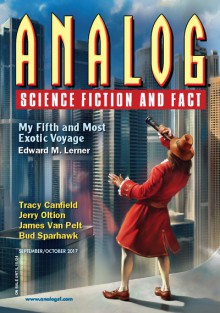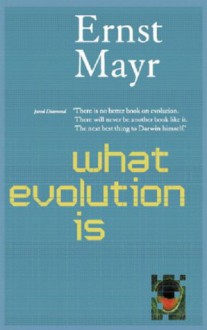
It's been a while since I read an issue of Analog. In fact, I visited my old home this weekend where I store old things such as the last Analog I read. There I found that the last one was the January/February 2010 issue. Having read the latest, I now recall why I liked it, but not enough to subscribe or purchase regularly from the bookstore.
I liked the more thoughtful hard-science stories, and I didn't like the Probability Zero story (a kind of fluff story meant to be ridiculous), with the science articles not really doing much for me, as they are a midge too technical for me.
There are quite a few stories in this issue, so I'll just hit the highlights:
My favorite stories both had something to do with alternate or parallel dimensions. Edward M. Lerner's "My Fifth and Most Exotic Voyage" is a delightful piece concerning the transportation of Jonathan Swift from his England to our Chicago (or at least, the Chicago of 2025). The whole thing is written in faux-Swiftian prose, and the point of view gives opportunity not only for Lerner to satirize our society (a thing Swift himself did in Gulliver's Travels) but also to present the scientific oddities surrounding time travel and parallel universes. The other parallel-universe story, "Ghostmail" by Eric del Carlo, is a superb tale of military romance across universes -- when a man's wife is presumed dead at the front lines of a war in distant parts of space, he gets "ghostmail" messages from her. The result is a poignant reflection on loss and replacement.
Analog is famous for its hard science fiction, and the hardest of the hard comes in Craig DeLancey's "Orphans", which follows a crew of scientists investigating the mysterious demise of automated space probes on an alien planet. They discover a strange biological pattern there, which serves as the scientific mystery around which the story revolves. This is the kind of hard sci-fi I often miss when I read Best Of anthologies.
I'm not sure whether I like Tom Jolly's "The Mathematician", but at least it challenged my brain. It's hard to imagine how the aliens described in this short story look, sound, and feel, but one can only say that they really are alien. An interesting thought experiment, at least.
Three stories written in an old-fashioned style of sci-fi adventure were a joy to read, despite their lack of innovation. Innovation doesn't make a story good, it only makes it new (neither a virtue nor a vice). Jerry Oltion, an Analog regular, tosses off a libertarian dystopia in "A Tinker's Damnation"; Rich Larson takes you to the swamp in "The Old Man"; and Christopher L. Bennett romps with an alien through an X-phile's sanctum in "Abductive Reasoning".
And speaking of old, Norman Spinrad has a new story: "The Sword of Damocles", a far-future speculation on the place of mankind in the universe. I'm a sucker for the sense of wonder evoked by stories told on a Stapledonian scale... and this one comes close to that kind of scale.
The rest of the issue had a few good stories ("Climbing Olympus" by Simon Kewin; "I Know My Own and My Own Know Me" by Tracy Canfield; and "Invaders" by Stanley Schmidt), but I didn't care for the rest. The novella ("Heaven's Covenant" by Bud Sparhawk) had a great opening paragraph but quickly lost me with a plot that seemed to go a lot of places but lack direction. It was the only story I actually gave up on.
All in all, a number of the stories were satisfying, but in terms of page count, I was satisfied with about 50% of the issue. Not bad, I guess, but not good enough to make me come back on a regular basis.
NEXT: I'll finish Strahan's Best of anthology, then probably try the November/December 2017 Asimov's Science Fiction if it's available at my local bookstores.

 Log in with Facebook
Log in with Facebook 








